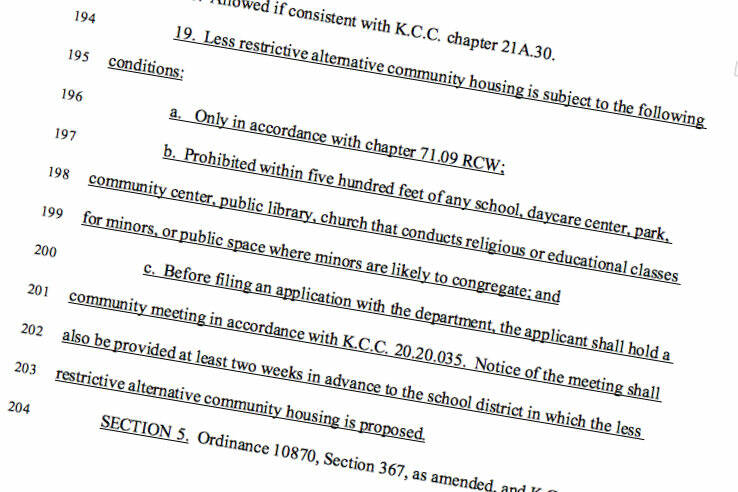An Enumclaw grassroots organization is fundraising for a legal push to reverse the placement of a group home for sex offenders while King County Councilmember Reagan Dunn has introduced legislation to switch up how these homes are sited in the county.
As a recap, this group home for former McNeil Island Special Commitment Center residents, called Garden House, went into operation last winter with its first resident.
Local residents were upset in general that this “Less Restrictive Alternative” (LRA) was now operating in the area, but were furious in particular over the fact that the Department of Social and Health Services, the Department of Corrections, and the home itself did not notify anyone that it was operating and taking in residents.
Save Our Children Enumclaw announced the “$40 for $40K” fundraiser last Saturday, May 6.
“Siting this type of treatment facility for civilly committed Sexually Violent Predators in a rural neighborhood surrounded by children, with no supervision and no public safety involvement; all communities deserve better from our government,” the press release read. “This fundraiser will create a fund to start the legal process to hold the owners of the facility accountable, as well as the government agencies that placed them here without any regard to community safety.”
Donations to the legal fund can be made online at gofund.me/51183a10. For more information about Save Our Children Enumclaw, visit www.saveourchildrenenumclaw.com.
PROPOSED LEGISLATION
The fundrainer comes on the heels of Dunn introducing a new ordinance requiring transitional homes for people who committed sex offenses obtain a conditional use permit on May 4.
As it currently stands, these transitional houses do not need to obtain any sort of permit to operate.
Additionally, LRAs do not need to give notice to county officials or neighborhoods when they open.
It should be noted that an alert was sent out about a sex offender from McNeil Island’s Special Commitment Center moving into the area via the King County Sheriff’s Department. The department regularly notifies neighborhoods when a “high level” sex offender has relocated, but it’s an opt-in system and doesn’t notify neighborhoods if an LRA is operating in the area.
Applying for a conditional use permit would mean an LRA needs to meet certain criteria before taking on residents, including determining the home would not be in conflict with the health and safety of the community, among others. A
After a conditional use permit application is complete, the county would send out notice to residents within 500 feet of the proposed LRA and open up a 21-day public comment period.
In an interview, Dunn said he understands that former McNeil Island residents have a constitutional right to not be indefinitely civilly committed, and King County is required by state law to have transitional housing available for these people — this means the county can’t use the conditional use permit process to shadow-ban LRAs.
“The placement of Mr. Knapp at this facility was an extremely poor siting decision that overlooked potential code violations and placed the facility with 500 feet of a school bus stops and in an agriculture zone. If even the most basic communication with King County and the community had occurred, these issues could have been address beforehand. This ordinance would give King County the ability ensure these DSHS’ own standards are met,” Dunn said in an email interview, referring to resident Stevan Knapp. “While we may consider which zones LRA Homes should operate, the primary purpose of this is to give the community notification during the initial siting of such a facility and ensure that the compliance with other county codes and basic community safety guidelines are followed, which DSHS had asserted they had done in the Knapp case.”
This new legislation would also require LRAs to be more than 500 feet away from schools, daycares, parks, community centers, libraries, churches that provide classes for minors, and public spaces where minors congregate. This expands the number of limitations currently required by state law, which only requires an LRA be 500 feet away from schools and licensed daycares (though additional stipulations could be added to an LRA resident’s conditional release on a case-by-case basis).
However, these proposed rules will not affect the already-established LRA in Enumclaw or the five others in Auburn, Seattle, Tukwila, and Shoreline.
While the ordinance has been introduced and will be sent to the Local Services and Land Use Committee, which meets next on May 23, the committee has not put considering the ordinance on that meeting’s schedule as of May 5, meaning it’s unclear if or when the ordinance will be sent to the full council.


